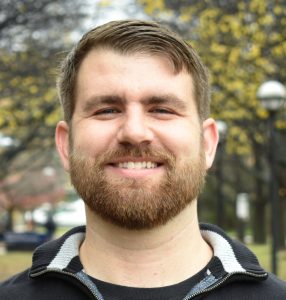Having always been more interested in the practical side of a PhD, Dr. Greg Ledva found a way to combine his Postdoctoral research with entrepreneurship during his time at the University of Michigan.
“I have always been interested in entrepreneurship and I didn’t want to focus on pure theory,” he said. “I wanted to develop things that are useful in solving problems that can actually be implemented.”
While earning his PhD in Electrical Engineering: Systems, Greg touched on several different entrepreneurial experiences, one was assisting his friends with actually starting a company by helping them discover use cases and writing an SBIR Grant for seed funding.
 “When I got to the tail end of the PhD entrepreneurship was something that I was very passionate about,” he said. “I had some real work experience understanding how things fit together and was really interested in making projects work in the real world.”
“When I got to the tail end of the PhD entrepreneurship was something that I was very passionate about,” he said. “I had some real work experience understanding how things fit together and was really interested in making projects work in the real world.”
After earning his PhD in 2018, Greg became a Research Fellow where he developed detailed electric load models from power usage data, programmed a residential demand response simulation environment with power network models to investigate network effects, and explored commercialization paths of demand response technology.
He determined this project had some real commercialization potential and spent time exploring the possibilities of the technology and the research, this led him to the Midwest I-Corps Node and eventually to the National Science Foundation’s Innovation Corps (I-Corps).
The I-Corps program uses experimental education to help researchers gain valuable insight into entrepreneurship, starting a business, or industry requirements and challenges.
It was while working on the commercialization potential of his Postdoctoral project that Greg had the opportunity to dig into the entrepreneurial side of his work.
“I did the regional program to get some experience learning what the practical applications were,” he said. “It seemed interesting and promising enough to pursue it further to the national program to really dig down and understand what the technology was able to do.”
One of Greg’s main takeaways from the programs is that he is now more willing to start conversations and make requests from people.
“These conversations have the ability to really open doors,” he said. “I don’t even know if I would have reached out to Bill when I found out he was hiring if I hadn’t been so used to reaching out to so many people through the program.”
![]() The Bill that Greg is referring to is William (Bill) Burke the Founder & CEO of Virtual Peaker, the 20-person startup where Greg currently works as a R&D Engineer.
The Bill that Greg is referring to is William (Bill) Burke the Founder & CEO of Virtual Peaker, the 20-person startup where Greg currently works as a R&D Engineer.
Virtual Peaker is a software platform that manages residential electric demand. It applies machine learning and real-time control to internet-enabled appliances to reduce demand while minimizing negative impact to the residential customer. The platform is accessed through a web browser, and has tailored portals for utility and residential users.
“That entrepreneurial push I received during my Postdoctoral research led me directly to my current position at this small company,” Greg said. “The work I am doing is directly applicable to everything I did during my PhD.”
In his current position at the startup, Greg has found a great fit for both his business and technical backgrounds, whether he is conducting customer interviews, working with the marketing team, or working with the software development team.
“To me entrepreneurship is embracing the unknown and being willing to dive into it and figure it out,” he said.
